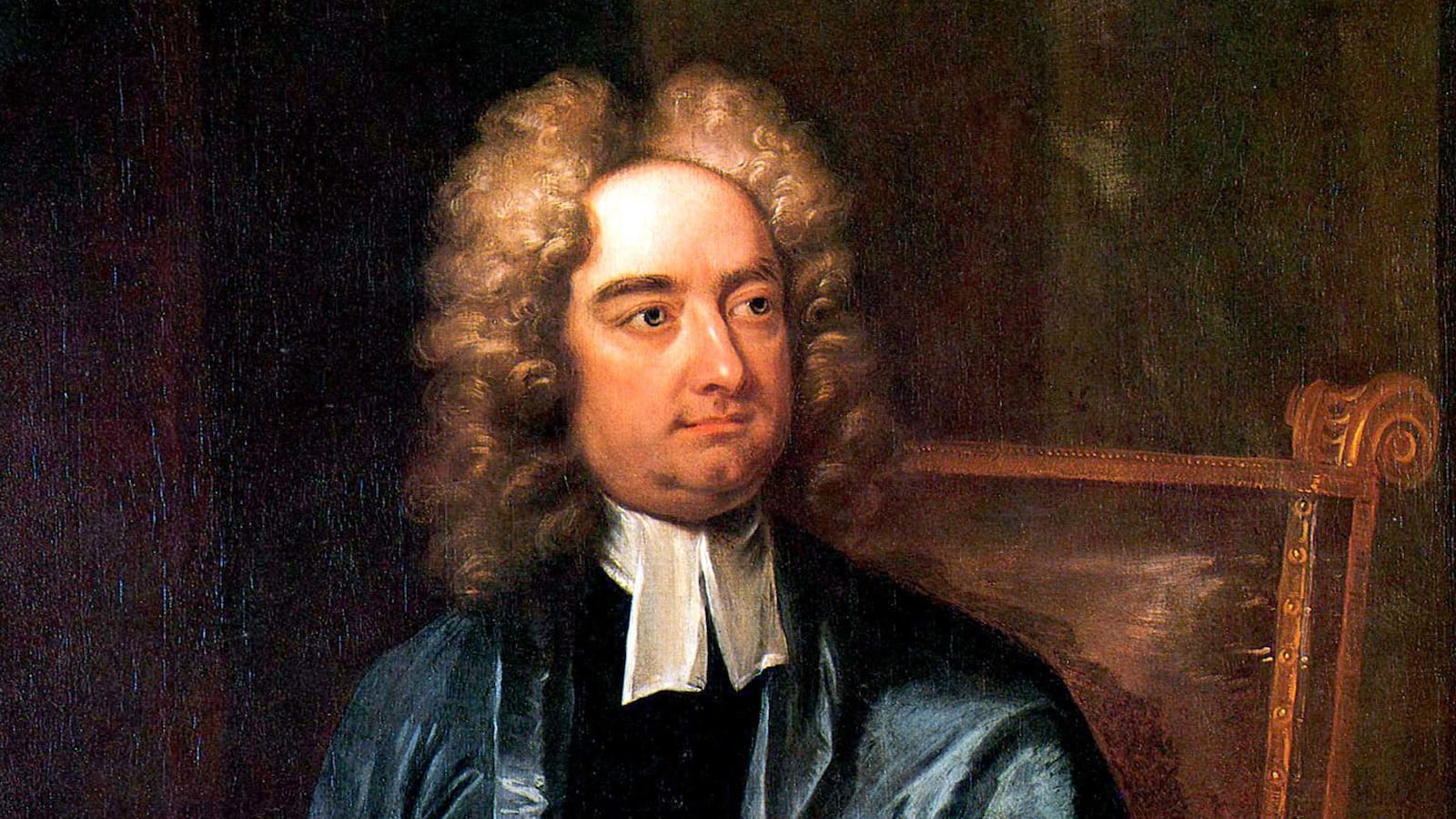Jonathan Swift’s “Essay upon the Art of Political Lying” tells us that “post-truth” statements are nothing new. “As the vilest writer hath his readers, so the greatest liar hath his believers: and it often happens, that if a lie be believed only for an hour, it hath done its work.” He was writing in 1710, but his words have been borne out by much that has happened in the last year. Swift also begged a question that many are asking now: Will there be any room left in politics for those who aren’t prepared to lie?
Swift’s hatred of falsehood sat oddly, in fact, with his love of a good fib. Some of his most celebrated works were elaborate hoaxes: His best known book, Gulliver’s Travels, was presented to the public as a voyager’s genuine memoir, and large numbers of readers were apparently taken in. Swift is generally regarded as the foremost satirist in English. It’s mentioned less often, though, that he was also a master of the primary art of getting facts in order and checking sources. By the time Gulliver emerged into the world, Swift had already made a formidable name for himself as a journalist as well as a satirist.
Satirists of course have license to exaggerate and distort; but Swift insisted that there was an absolute link between verifiable fact and moral truth. He had a devastating way of letting figures speak for themselves. In one of his first publishing sensations, an anti-war work called The Conduct of the Allies (1711), he used secret information provided by friends within government. The Conduct was an epoch-shattering critique of the corrupt means being used to prolong Britain’s war against France. Swift exposed a political and financial elite set on warfare for the sake of profit, and demonstrated that “Shock Doctrine” tactics were in use long before 20th century economists figured them out. His astounding book, staggering for its deployment of research and privileged information as well as lethally brilliant writing, helped end a long and largely senseless campaign.
Swift often wrote of satire as holding up a mirror or magnifying glass to reality. Before Swift, the word “satire” was often synonymous for “libel,” the idea being that satirical writers could say more or less anything they wanted about someone they hated. Swift was not at all timid when it came to voicing his dislikes, but sought to restore a higher purpose to his chosen mode of writing. For it to carry weight, satirical mockery had to be based on solid claims. And it was important, then as now, that satire scored the points it needed: for by making people of influence seem ridiculous when they acted wrongly, it made them seem a little less frightening, and opened a space in which there could be meaningful free speech about what such people were doing.
As a protest writer in the 1720s and ’30s, Swift laid bare the injustice of British rule in Ireland. He was an Irishman himself, born in Dublin in 1667, but to English parents. To give his writing substance he went to inordinate lengths in checking the situation in the Irish countryside, where people were starving as a result of exploitative land practices and repressive legislation. He made sure that he was fully up to date with the most reliable trade figures and consulted widely with well-placed sources in business and administration.
His subsequent approach to writing itself was a dangerous one, namely to take a “post-truth” mentality as far as it could go. He fought hypocrisy by creating a series of masks. The most memorable specimen in his portfolio was his Modest Proposal, a short essay of 1729. In this he assumed the voice of an entirely sincere and indeed socially concerned psychopath. Swift’s “proposer” argues calmly that poor Irish children could be sold as delicacies for wealthy tables. The essay’s power comes partly from Swift’s vision of where callousness might lead, but also from a ruthlessly detached observation of reality. He described scenes of deprivation that all his readers could recognize.
Many of the great satirical hits in Gulliver’s Travels also take their strength from Swift’s honesty about facts that his fellow Britons and Europeans preferred to ignore or view differently. One such moment comes when Gulliver explains to the gigantic king of Brobdingnag how politics and war work in Europe. Nothing he says is very sensational; Swift’s readers could deny none of it. And so the king of Brobdingnag concludes that most of them must belong to a really horrible species of “vermin.”
A large part of Swift’s cultural legacy is his way of showing how even morally developed people can be brought to accept horrifying practices. The secret is tied up with what those people assume to be the truth. In the Travels, a morally “superior” race of horse-beings—Swift loved horses—share their land with rather brutal, dishonest and undeniably filthy humans, the Yahoos. The horses decide they have no choice but to exterminate their two-legged neighbors. This “final solution” is arguably the punishment Swift is saying we humans will ultimately deserve—for our violence to each other and contempt for the environment. But he leaves a less than inspiring image of those killer horses, which had recognizable counterparts in Swift’s actual world.
The scale and daring of “post-truth” politics might lead some to think that lies can only be fought with lies. The work of Jonathan Swift should make us pause at such a moment: the moral case, Swift urged, is undeniable when the empirical case has clear validity. This unparalleled creator of satirical fiction demonstrated that those concerned with truth should keep faith with it.
John Stubbs studied English at Oxford and Renaissance literature at Cambridge, where he completed a doctorate. His new biography, Jonathan Swift: The Reluctant Rebel, will be released from W.W. Norton on February 28. He lives in Ljubljana, Slovenia.






